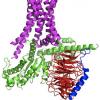I did a bit of research and apparently a sugar alcohol called Erythritol is an antioxidant.
if a superoxide radical or hydroxy radical bonds to Erythritol, then eventually, it becomes harmless CO2.
an added bonus is its quick absorption, lack of effect on insulin or kidney function.
http://www.ncbi.nlm....pubmed/19632091this article means that Erythritol is an antioxidant that may be good for working against the hydrogen peroxide damage.
Erythritol is a simple sugar, it is basically another form of energy except your body cannot metabolize it so what I brilliantly came up with was that It might be good to take If you use c60, because not only does Erythritol have potential to be used as an antioxidant against c60's toxic effect on kidney cells, when it is oxidized, it becomes a huge source of energy.
Erythritol tetra nitrate is basically Erythritol with the oxidating function attached to the molecule, and its detonating velocity is 8000m/s and although that may not mean much to you, it means that Erythritol is very capable of being an energy source. most other explosives don't even touch 8000m/s so that shows ETN's quick and efficient production of energy, which is after all what we all need.
http://en.wikipedia....tion_velocitieshttp://en.wikipedia....ol_tetranitrateI have tried Erythritol and can give claim to its use. Taking it around bed time completely stops all tiredness I have, and I don't crash while on it.
I use c60 with Erythritol which probably is why I derived an effect from Erythritol.
theoretically, what happened was that c60 efficiently turned the Erythritol into acetyl groups that my body needed.
I find that If I do CR after taking Erythritol, I don't become hungry at all.
the only side effect from Erythritol was light muscle pain which may have been from a build up of acetate in my body.
Edited by anagram, 08 December 2012 - 01:46 AM.




















































